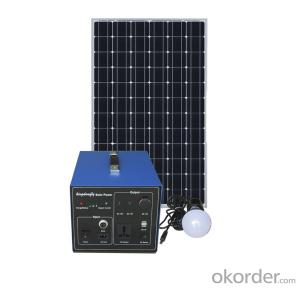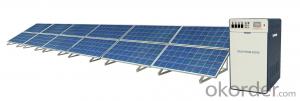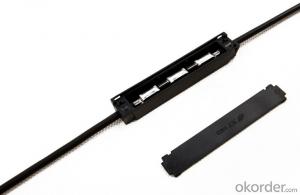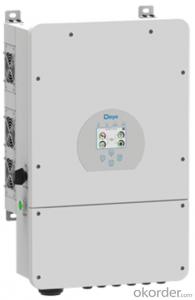Off-Grid Solar Power System 1.5KW High Efficiency
- Loading Port:
- China main port
- Payment Terms:
- TT OR LC
- Min Order Qty:
- 1 pc
- Supply Capability:
- 10000 pc/month
OKorder Service Pledge
OKorder Financial Service
You Might Also Like
1.Description of Product
Off-Grid Solar Power System is consisted of solar panel, solar charge controller, inverter, battery, mounting rack and cables.
(1).Grid-connected, send power to city grid
(2).MPPT technology, wide range of working voltage
(3).Simply Wiring, easy installation, customized design for your projects
(4).Low investment & long term feedback
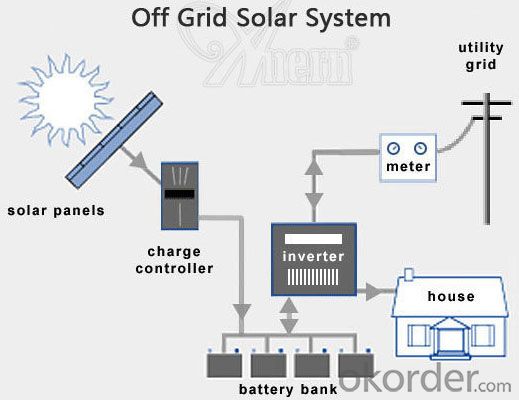
2. Off-Grid Features
1. Off grid solar power system is mainly used for application with relatively-small power consumption, and the areas have no grid network coverage, or grid power is unstable or outage condition.
2. It’s composed of solar panels, hybrid solar inverter, battery bank, solar panel mounting racks, and other accessories required fora complete home solar power system.
3. The battery bank gives a stable power output to the solar inverter which converts DC to AC to power loads, and provides power backup in rainy or cloudy days.
4. The solar panels generate electricity at daytime and charge the battery bank .
5. The off grid home solar power system provides grid power bypass in case of battery power shortage when sunshine is not enough.
6. All the off grid home solar power system configurations are worked out by scientific calculation and design.
The Product Parameter | |
Ref No. | 1.5KW |
Solar Panel | Type: Monocrystalline Silicon PV Module Max Power: 250W QTY:4 pcs |
Controller-Inverter Integrator | Rated Ouput Power: 1500W Rated DC Voltage: 48V QTY:1 pcs |
Battery | 12V/200AH per piece QTY:4 pcs |
Solar Panel Rack | Roof type mounting rack, anodized aluminum material, including complete fittings (Other type of racks can be customized as per client's requirement) QTY:1 pcs |
Cables | International standard, with specification suitable for solar system, RVV2*6 QTY:30m |
3.The Pictures of Product
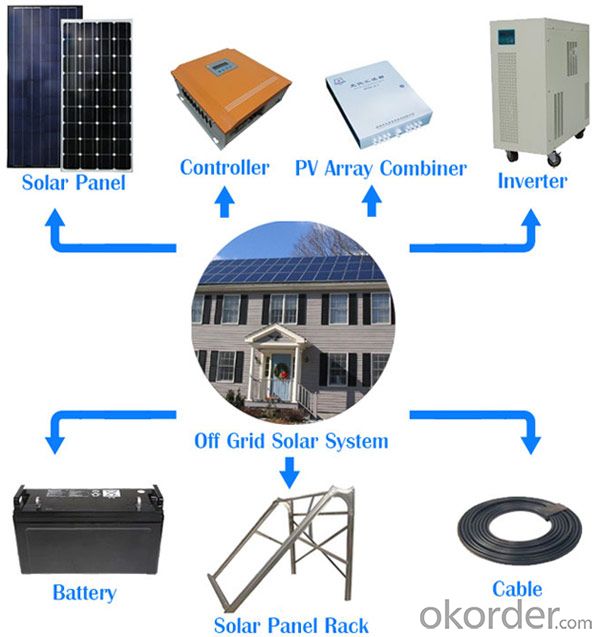
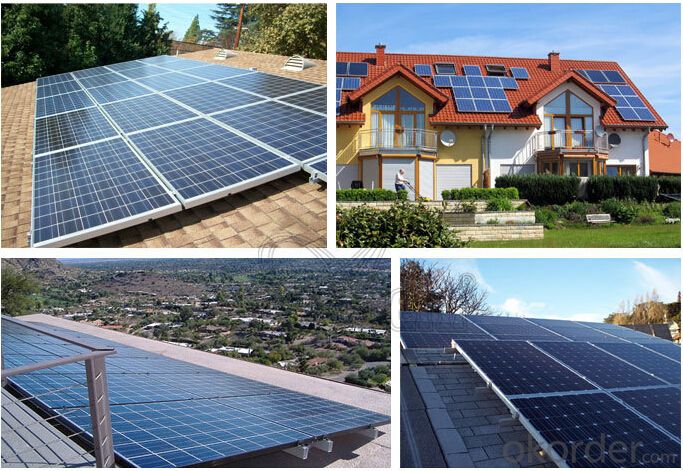
4.FAQ
Q1: What is the business type for the company?
A1: We are one of the biggest manufacturers inBejing.Chnia. Which is a high tech PV enterprise dedicated to the research, development, production and sales..
Q2: How long solar panel warranty can you offer?
A2: 10-Year product warranty,25-year linear power output warranty
If there is any quality problem, we will pay for freight and send free parts to you.
Q3: How many certificates do you have?
A3: We have 16 certificates,such as CE, TUV, UL, and so on.
Q4: Can I be the agent for you?
A4: Yes,We can discuss some information.
Q5: How to get a sample?How can cooperation with us
A5: contact us now.
- Q:How efficient are solar energy systems?
- Solar energy systems are highly efficient as they convert sunlight directly into electricity or heat without any emissions or moving parts. They have an average efficiency of 15-20% for solar panels, but advanced technologies can achieve efficiencies of up to 40%. Additionally, solar systems can be optimally designed and integrated to maximize their efficiency and energy output.
- Q:Can solar energy systems be used for powering remote sensing devices?
- Yes, solar energy systems can be used to power remote sensing devices. Solar panels can convert sunlight into electricity, which can then be used to power various types of remote sensing devices such as weather stations, environmental monitoring systems, and satellite communication equipment. This allows for the collection and transmission of data in remote areas where access to traditional power sources may be limited or unavailable.
- Q:How do solar energy systems impact job creation?
- Solar energy systems have a significant positive impact on job creation. The installation and maintenance of solar panels require skilled workers, leading to the creation of employment opportunities in the renewable energy sector. Additionally, the growth of the solar industry stimulates job creation in related fields such as manufacturing, research, and development. The shift towards solar energy not only contributes to a cleaner environment but also fosters economic growth by generating jobs at various stages of the solar energy supply chain.
- Q:How do solar energy systems impact social equity?
- Solar energy systems can have a positive impact on social equity by providing affordable and clean energy options to underserved communities. By reducing reliance on fossil fuels and the associated costs, solar energy can help alleviate energy poverty and promote equal access to electricity. Additionally, solar installations can create job opportunities, particularly in disadvantaged areas, contributing to economic empowerment and reducing inequality.
- Q:What is the role of power optimizers in a solar energy system?
- Power optimizers play a crucial role in a solar energy system by maximizing the energy output of each individual solar panel. They ensure that panels operate at their maximum efficiency, even when one panel is underperforming due to shading or other issues. By individually monitoring and optimizing the power output of each panel, power optimizers enhance the overall system performance and improve the overall energy harvest of the solar installation.
- Q:Can solar energy systems be used in areas with limited access to solar energy incentives and rebates?
- Yes, solar energy systems can still be used in areas with limited access to solar energy incentives and rebates. While incentives and rebates can make solar installations more affordable, the feasibility of solar energy systems depends on factors such as the availability of sunlight and the cost of traditional energy sources. In areas with limited solar incentives, the decision to install solar panels should be based on factors like long-term cost savings, energy independence, and environmental benefits. Additionally, advancements in solar technology and decreasing costs make solar energy a viable option even without incentives.
- Q:Can solar energy systems be used in agricultural settings?
- Yes, solar energy systems can definitely be used in agricultural settings. In fact, the use of solar energy in agriculture has been gaining popularity in recent years. Solar panels can be installed on rooftops or as ground-mounted systems in agricultural fields to generate clean and renewable electricity. There are several ways in which solar energy can be utilized in agricultural settings. One common application is to power irrigation systems. Solar-powered water pumps can efficiently draw water from wells or other water sources and distribute it for irrigation purposes. This helps farmers reduce their dependence on fossil fuel-powered pumps and lowers their overall energy costs. Solar energy can also be used to power electric fences, lighting systems, and ventilation systems in livestock operations. These systems help improve the conditions for animals, enhance productivity, and reduce the environmental impact of traditional energy sources. Additionally, solar energy can be utilized for crop drying and processing. Solar dryers can be used to remove moisture from crops, reducing the risk of spoilage and improving their shelf life. Solar-powered processing equipment, such as grain mills and oil presses, can also be employed to enhance the efficiency and sustainability of agricultural operations. Moreover, solar energy systems can provide a reliable source of electricity to remote agricultural areas that are not connected to the grid. This enables farmers to access modern technologies and improve their productivity and income. Overall, the integration of solar energy systems in agricultural settings offers numerous benefits. It reduces greenhouse gas emissions, decreases reliance on fossil fuels, lowers energy costs, improves efficiency, and enhances the sustainability of agricultural practices. Therefore, solar energy is a viable and promising option for powering various agricultural activities.
- Q:Can solar energy systems be used for powering off-grid humanitarian missions?
- Yes, solar energy systems can be used for powering off-grid humanitarian missions. Solar energy is a reliable and sustainable source of power that can be harnessed in remote locations where grid electricity is not available. By installing solar panels and associated equipment, such as batteries and inverters, humanitarian missions can generate electricity to meet their energy needs, powering lights, communication devices, medical equipment, and more. Solar energy systems offer a cost-effective and environmentally friendly solution, enabling these missions to operate independently and effectively in off-grid areas.
- Q:Are there any advancements in solar energy system technology?
- Yes, there have been significant advancements in solar energy system technology. These include improvements in photovoltaic (PV) cell efficiency, the development of more durable and flexible solar panels, and the integration of energy storage solutions. Additionally, there have been advancements in solar tracking systems, allowing panels to optimize sunlight capture throughout the day. These advancements have made solar energy more affordable and efficient, contributing to its increasing adoption worldwide.
- Q:Can a solar energy system withstand extreme weather conditions?
- Yes, a solar energy system can withstand extreme weather conditions. Solar panels are designed to be durable and are built to withstand a range of weather conditions, including extreme heat, cold, wind, rain, and snow. They are made with tempered glass and are often tested to ensure they can withstand hailstorms or heavy snow loads. Additionally, solar panels are typically installed securely to withstand strong winds and are designed to be resistant to corrosion. Overall, while extreme weather conditions can have some impact on solar energy production, solar energy systems are built to withstand and continue operating effectively in a variety of weather conditions.
1. Manufacturer Overview |
|
|---|---|
| Location | |
| Year Established | |
| Annual Output Value | |
| Main Markets | |
| Company Certifications | |
2. Manufacturer Certificates |
|
|---|---|
| a) Certification Name | |
| Range | |
| Reference | |
| Validity Period | |
3. Manufacturer Capability |
|
|---|---|
| a)Trade Capacity | |
| Nearest Port | |
| Export Percentage | |
| No.of Employees in Trade Department | |
| Language Spoken: | |
| b)Factory Information | |
| Factory Size: | |
| No. of Production Lines | |
| Contract Manufacturing | |
| Product Price Range | |
Send your message to us
Off-Grid Solar Power System 1.5KW High Efficiency
- Loading Port:
- China main port
- Payment Terms:
- TT OR LC
- Min Order Qty:
- 1 pc
- Supply Capability:
- 10000 pc/month
OKorder Service Pledge
OKorder Financial Service
Similar products
New products
Hot products
Hot Searches
Related keywords








